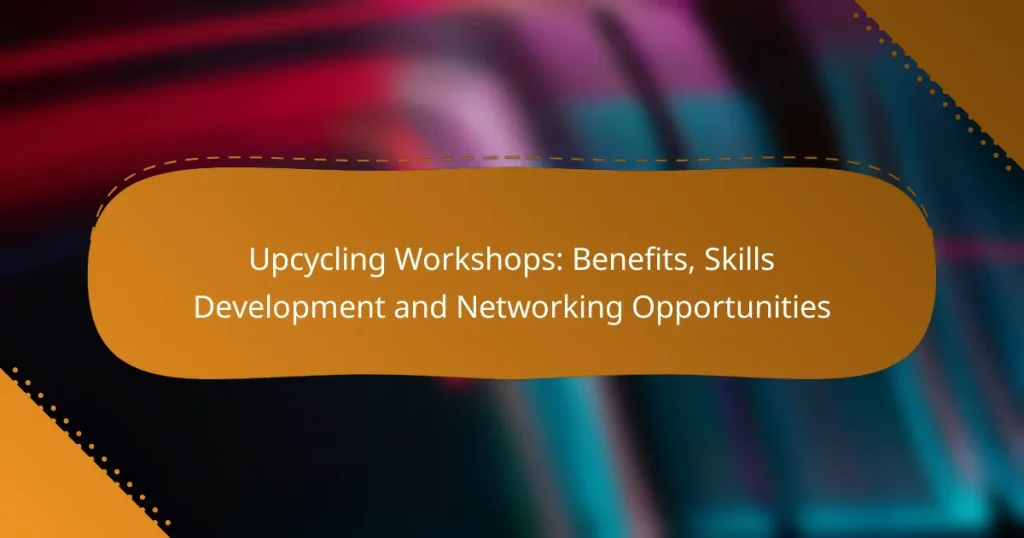Upcycling workshops provide a unique platform for individuals to engage in sustainable practices while enhancing their creativity and resourcefulness. Participants gain hands-on experience in transforming waste materials into new products, developing valuable skills that contribute to personal and professional growth. Additionally, these workshops foster networking opportunities, connecting like-minded individuals and local businesses dedicated to sustainability.
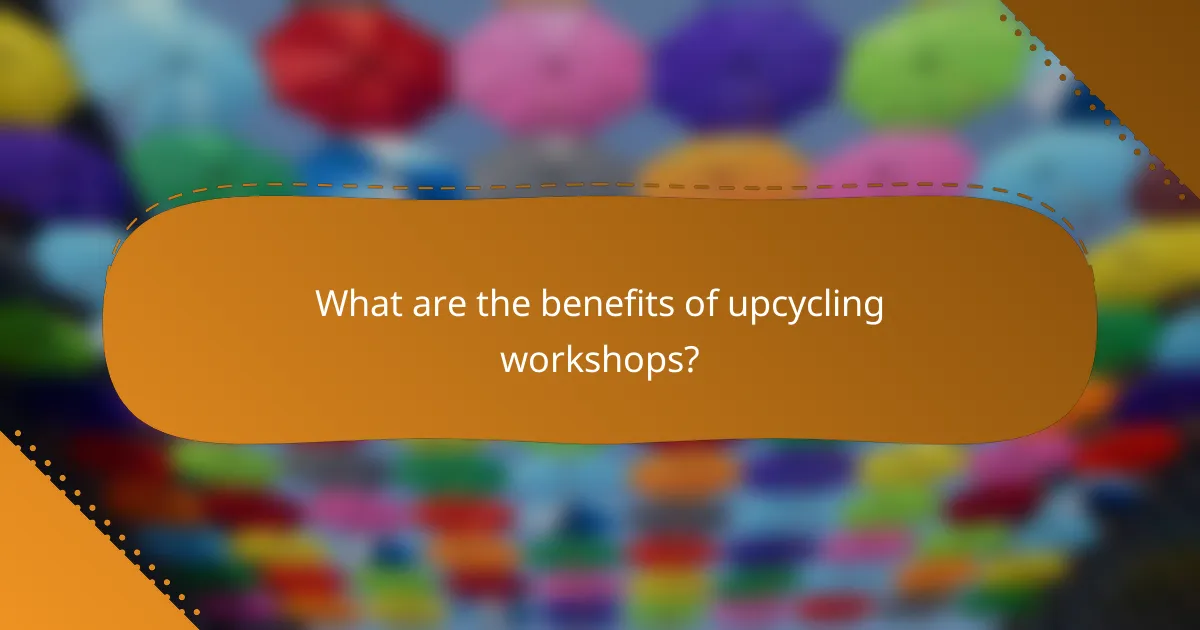
What are the benefits of upcycling workshops?
Upcycling workshops offer numerous benefits, including promoting environmental sustainability, fostering creativity, and enhancing community engagement. Participants not only learn valuable skills but also contribute to reducing waste and saving costs.
Environmental sustainability
Upcycling workshops significantly contribute to environmental sustainability by transforming waste materials into new products. This process reduces the amount of waste sent to landfills and decreases the demand for new resources, which can help lower carbon footprints.
By participating in these workshops, individuals learn about the importance of recycling and reusing materials, which can inspire more sustainable practices in their daily lives. Simple projects, such as turning glass jars into storage containers or old clothing into tote bags, exemplify how upcycling can benefit the environment.
Cost savings
Engaging in upcycling workshops can lead to substantial cost savings. Participants often use materials they already have at home, minimizing the need to purchase new items. This not only saves money but also encourages resourcefulness.
For instance, instead of buying new furniture, individuals can upcycle old pieces with a fresh coat of paint or new upholstery. This approach can save participants hundreds of dollars while creating unique, personalized items.
Creative expression
Upcycling workshops provide a platform for creative expression, allowing participants to explore their artistic abilities. By reimagining discarded materials, individuals can create one-of-a-kind pieces that reflect their personal style.
Whether it’s crafting jewelry from old electronics or designing home decor from reclaimed wood, these workshops encourage innovation and out-of-the-box thinking. Participants often leave with a sense of accomplishment and newfound confidence in their creative skills.
Community engagement
These workshops foster community engagement by bringing together individuals with a shared interest in sustainability and creativity. Participants can connect with like-minded people, share ideas, and collaborate on projects, strengthening community bonds.
Local organizations often host upcycling workshops, creating opportunities for networking and building relationships. This sense of community can lead to further initiatives aimed at promoting sustainability and environmental awareness.
Skill enhancement
Upcycling workshops are an excellent way to enhance various skills, including crafting, design, and problem-solving. Participants learn practical techniques for transforming materials, which can be applied to future projects.
Workshops often cover a range of skills, from basic sewing to woodworking, allowing individuals to discover new hobbies or refine existing ones. This hands-on experience can boost confidence and inspire participants to take on more ambitious upcycling projects in the future.
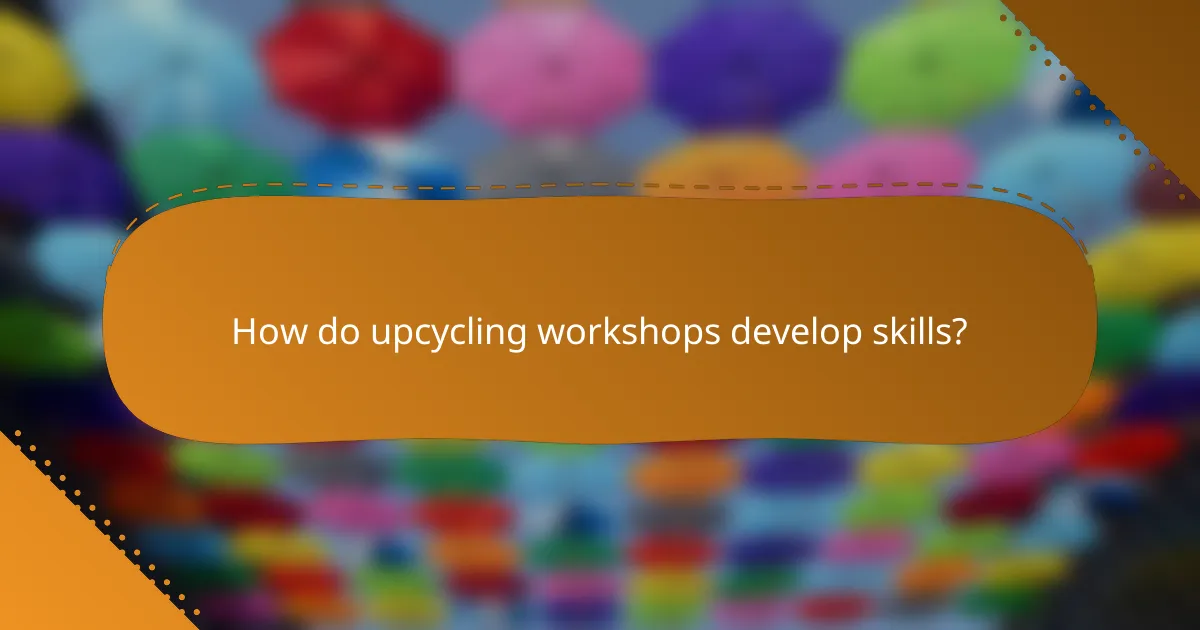
How do upcycling workshops develop skills?
Upcycling workshops are effective in developing a variety of practical skills that enhance creativity and resourcefulness. Participants learn to transform waste materials into new products, gaining hands-on experience that fosters both technical and soft skills.
Hands-on crafting techniques
In upcycling workshops, participants engage in hands-on crafting techniques that teach them how to manipulate materials creatively. They learn skills such as sewing, woodworking, and painting, which are essential for turning discarded items into functional or decorative pieces.
For example, a workshop might focus on converting old furniture into stylish home decor, allowing participants to practice sanding, painting, and upholstery techniques. These practical skills can be applied in various DIY projects beyond the workshop setting.
Problem-solving abilities
Upcycling inherently involves problem-solving, as participants must find innovative ways to repurpose materials. This process encourages critical thinking and adaptability, as they often face challenges like material limitations or design constraints.
For instance, if a participant is tasked with creating a lamp from a glass bottle, they must consider electrical safety, stability, and aesthetics. Such challenges enhance their ability to think creatively and develop solutions on the spot.
Project management skills
Managing an upcycling project requires planning, organization, and time management. Participants learn to set goals, allocate resources, and track progress, which are valuable skills in both personal and professional contexts.
Workshops often involve multiple steps, from brainstorming ideas to executing the final product. This structured approach helps participants understand how to manage their time effectively and prioritize tasks to meet deadlines.
Collaboration and teamwork
Upcycling workshops frequently involve group projects, fostering collaboration and teamwork among participants. Working with others encourages communication, negotiation, and the sharing of ideas, which are essential for successful group dynamics.
For example, a group might collaborate to create a community art installation from recycled materials. This experience not only builds interpersonal skills but also teaches participants how to leverage each other’s strengths to achieve a common goal.
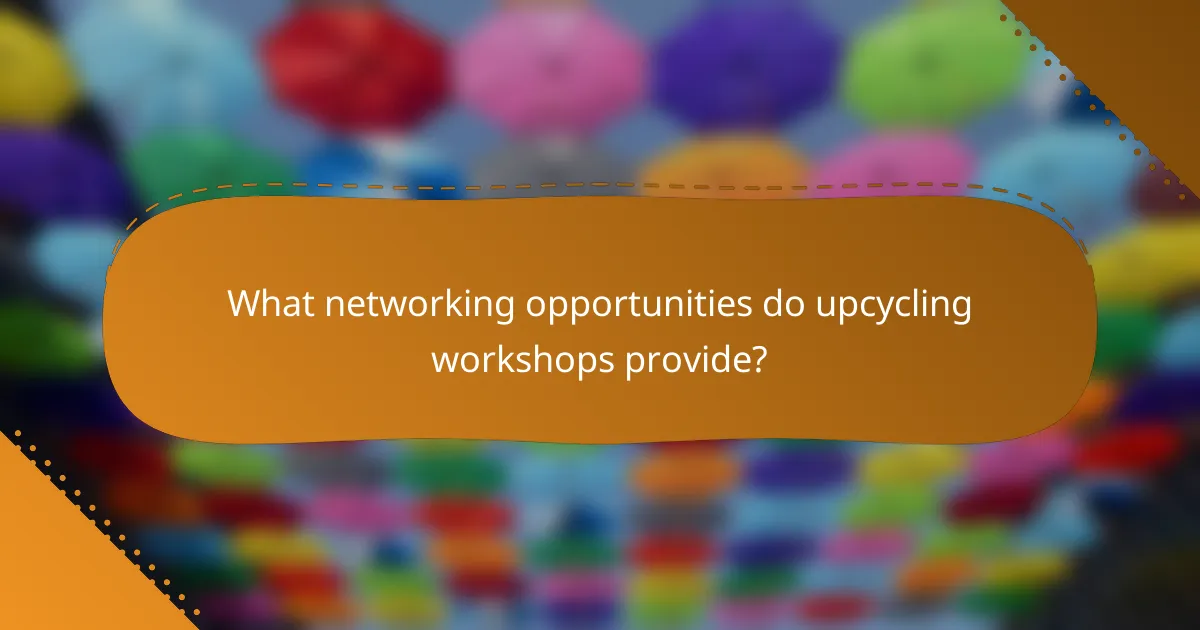
What networking opportunities do upcycling workshops provide?
Upcycling workshops offer valuable networking opportunities by connecting participants with like-minded individuals and local businesses focused on sustainability. These interactions can lead to collaborations, partnerships, and community engagement that enhance both personal and professional growth.
Connections with local artisans
Participating in upcycling workshops allows individuals to meet local artisans who specialize in various crafts. These artisans often share their skills and techniques, fostering a collaborative environment where creativity thrives. Building relationships with these professionals can lead to mentorship opportunities and potential collaborations on future projects.
For example, a workshop participant might connect with a local furniture maker, leading to a joint project that combines upcycled materials with expert craftsmanship. Such partnerships can enhance the quality of work and expand creative horizons.
Access to eco-conscious businesses
Upcycling workshops frequently attract eco-conscious businesses that prioritize sustainability in their operations. Participants can network with these businesses to explore potential partnerships, internships, or job opportunities in the green economy. This access can be particularly beneficial for those looking to enter fields related to environmental conservation or sustainable design.
For instance, a participant might meet a local eco-friendly brand that is interested in sourcing upcycled materials for their products, creating a mutually beneficial relationship that supports both the business and the workshop participant.
Collaboration with community organizations
Many upcycling workshops collaborate with community organizations focused on environmental education and sustainability initiatives. These partnerships can provide participants with additional resources, support, and visibility within the community. Engaging with these organizations can also lead to volunteer opportunities and involvement in larger sustainability projects.
For example, a workshop might partner with a local nonprofit that promotes recycling and waste reduction, allowing participants to contribute to community events or educational programs. This collaboration not only enhances networking but also strengthens community ties and promotes a shared commitment to sustainability.
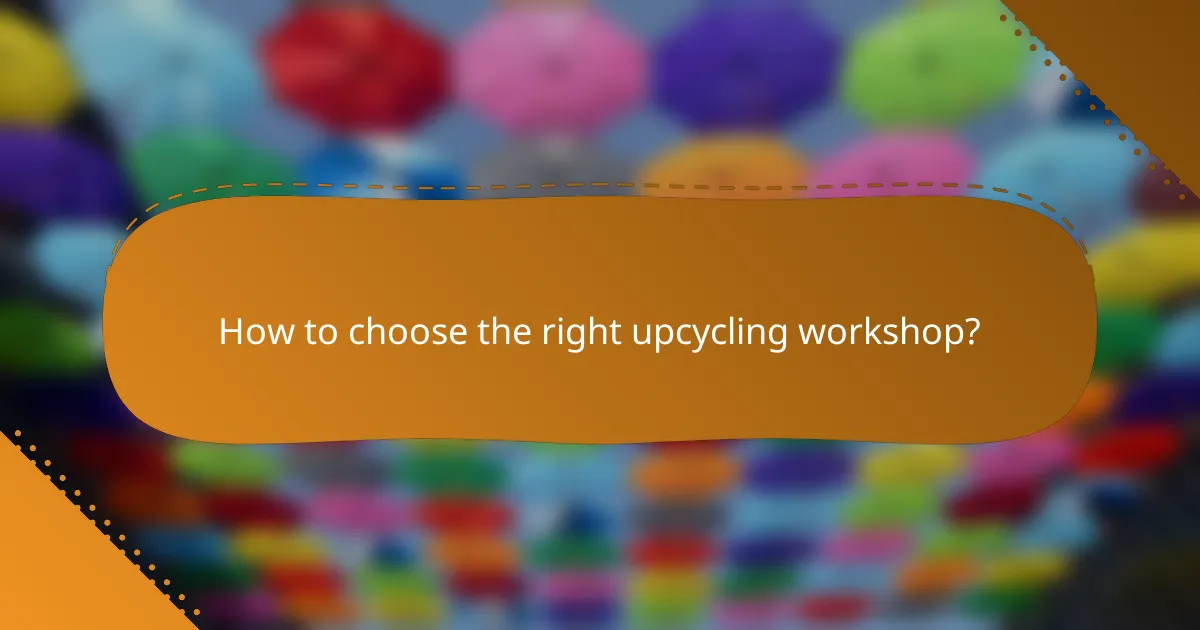
How to choose the right upcycling workshop?
Choosing the right upcycling workshop involves assessing the instructor’s qualifications, understanding the workshop format and duration, and knowing what materials will be provided. These factors can significantly influence your learning experience and the skills you develop.
Instructor qualifications
When selecting an upcycling workshop, consider the instructor’s background and experience in upcycling and related fields. Look for instructors with relevant certifications, years of hands-on experience, or a portfolio showcasing their work. An experienced instructor can provide valuable insights and techniques that enhance your learning.
Additionally, check for reviews or testimonials from previous participants. Positive feedback can indicate the instructor’s ability to engage and effectively teach the material, ensuring a more enriching experience.
Workshop format and duration
Workshops can vary in format, including hands-on sessions, lectures, or a combination of both. Determine which format aligns with your learning style. For instance, if you prefer practical experience, look for workshops that emphasize hands-on activities.
Duration is another critical factor; workshops can last anywhere from a few hours to several days. Consider how much time you can commit and whether the workshop’s length will allow you to fully grasp the concepts and techniques being taught.
Materials provided
Check what materials are included in the workshop fee. Some workshops provide all necessary supplies, while others may require you to bring your own materials. Understanding this can help you budget appropriately and ensure you have everything needed for a successful experience.
Additionally, inquire about the quality of the materials provided. High-quality supplies can enhance your learning and the final products you create, making it worthwhile to invest in workshops that prioritize good materials.
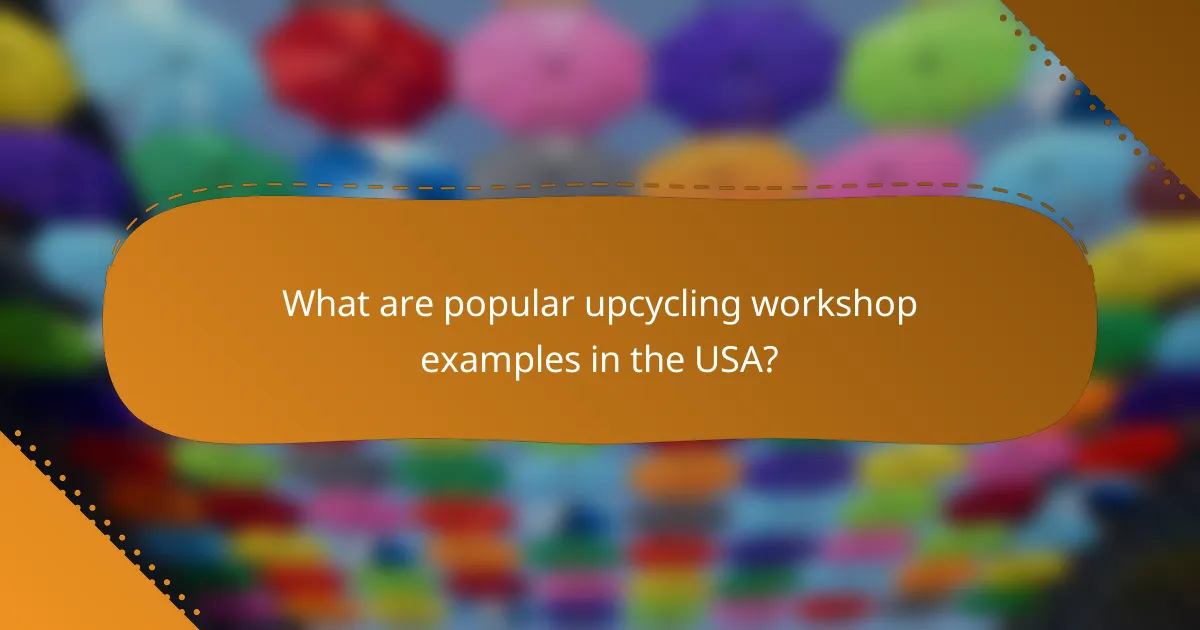
What are popular upcycling workshop examples in the USA?
In the USA, popular upcycling workshops focus on transforming waste materials into functional or artistic items. These workshops not only promote sustainability but also provide hands-on skills and community engagement.
Reclaimed Wood Workshop in Portland
Portland is known for its vibrant DIY culture, and reclaimed wood workshops are a popular choice for those looking to create unique furniture pieces. Participants learn how to source reclaimed wood, understand its properties, and use appropriate tools for cutting and assembling.
Workshops typically cover techniques for finishing and preserving wood, ensuring that the final product is both beautiful and durable. Expect to spend a few hours to a full day, depending on the complexity of the project.
Fabric Upcycling Classes in New York City
In New York City, fabric upcycling classes attract those interested in fashion and sustainability. These classes teach participants how to repurpose old clothing and textiles into new garments or accessories, emphasizing creativity and resourcefulness.
Classes often include hands-on sewing instruction, pattern-making, and tips for selecting suitable fabrics. Participants should bring their own materials, and many workshops provide sewing machines and tools for use during the session.
Furniture Restoration Workshops in Los Angeles
Los Angeles offers furniture restoration workshops that focus on breathing new life into old furniture pieces. Participants learn techniques such as sanding, painting, and reupholstering, gaining valuable skills for both personal projects and potential resale.
These workshops typically last several hours and may require participants to bring their own furniture items. It’s advisable to check in advance for any specific materials needed to ensure a successful restoration experience.
